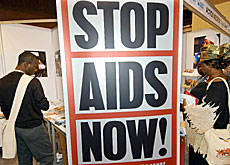Aids Day focuses on risks facing women

The Swiss Aids Federation is using World Aids Day to draw attention to the fact that women are becoming increasingly vulnerable to HIV infection.
Campaigners say growing poverty and a lack of self-determination mean women and girls are now more at risk of contracting the virus than men.
The organisers of World Aids Day have chosen “Women, girls, HIV and Aids” as the theme for this year’s campaign.
“World Aids Day is a day of solidarity with HIV-positive people and those living with Aids, and it is also a good opportunity to remind people that HIV is still an issue,” Beatrice Aebersold, head of the Bern branch of the Swiss Aids Federation, told swissinfo.
The dangers facing women were highlighted last week in a report by UNAids and the World Health Organization (WHO). It showed that about half of the 37.2 million adults infected with HIV are female.
In Switzerland, more men are still being infected than women, but only just.
“Of 750 people tested positive for HIV in Switzerland last year, 42 per cent were women,” said Aebersold.
Vulnerability
She said women’s vulnerability was linked primarily to socio-economic conditions.
“Their living conditions are often more disagreeable and disadvantageous than men’s.”
Aebersold cites poverty, unemployment, prostitution, violence and women’s overall dependence on men as the main reasons for their increased risk of contracting HIV.
“There are many situations in which women cannot exercise self-determination.”
The problem is most obvious in poorer countries, but Aebersold says Switzerland is far from immune.
“Last year’s tests showed that 52 per cent of those infected were immigrants [as opposed to 29 per cent ten years ago] and that the majority were women,” she said.
Under control
Roberto Induni, director of the Swiss Aids Federation, said women from sub-Saharan Africa were most affected by HIV/Aids.
“[They] have been more exposed to HIV/Aids, because these countries have high rates of infection. There are also quite a few factors from the sociological point of view that affect women. They cannot choose their sex partner or [take] measures to protect themselves.”
Induni says the Federation uses “mediators” who speak the languages of immigrants to inform them about prevention and treatment.
“[Offering] this kind of contact is very successful… because we’re trying to reach them and to change deeply-rooted beliefs. It’s not easy to discuss sexuality in a society that never talks about it.”
Spreading
As in most industrialised countries, HIV is thought to have started spreading in Switzerland in the 1970s.
Initially, the most vulnerable groups were male homosexuals and drug addicts. But HIV started to infect heterosexuals in the mid-1980s, and since then the number of women contracting the virus has been steadily rising.
The Swiss Aids Federation maintains that today 54 per cent of all HIV infections are transmitted through unprotected sex among heterosexuals.
Girls and young women are the most vulnerable, says Aebersold. “In Switzerland, women most at risk are aged 20 to 40, whereas worldwide they are even younger, maybe 13 or 14.
“Poverty, [unemployment] and a low level of education affect women and female immigrants in particular, driving many of them into prostitution. They cannot easily protect themselves from the risk of HIV infection.”
swissinfo, Katalin Fekete
People living with HIV/Aids:
Worldwide: 40 million
Switzerland: 20,000
Women living with HIV/Aids:
Worldwide: 18 million women and girls.
Switzerland: 5,000 to 6,000 women.
World Aids Day is focusing on the growing risk of HIV infection among women and girls.
Campaigners say women’s vulnerability is linked to socio-economic factors, which deprive them of their right of self-determination right and drive them into poverty and prostitution.

In compliance with the JTI standards
More: SWI swissinfo.ch certified by the Journalism Trust Initiative













You can find an overview of ongoing debates with our journalists here . Please join us!
If you want to start a conversation about a topic raised in this article or want to report factual errors, email us at english@swissinfo.ch.